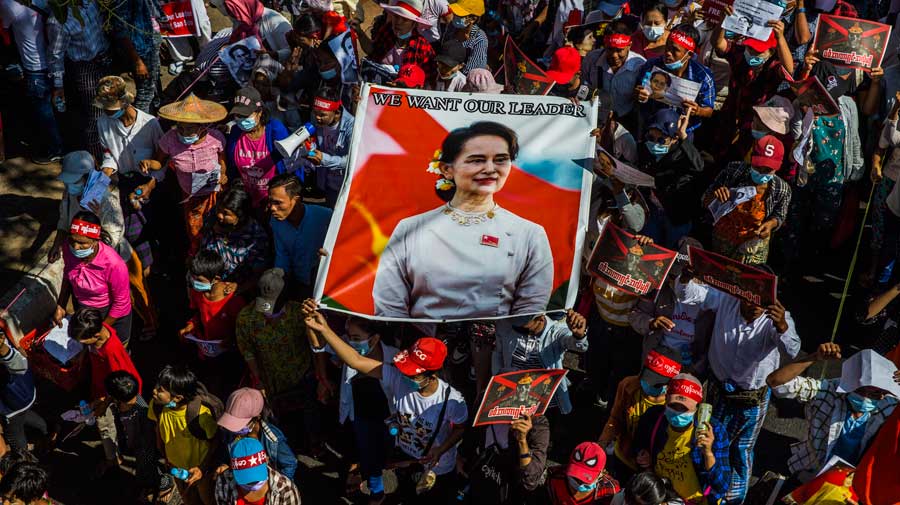Myanmar has been in turmoil since the army seized power and detained civilian government leader Aung San Suu Kyi and much of her party leadership after the military complained of fraud in a November election.
Protests and strikes have taken place daily for about three weeks, and students had planned to come out again in the commercial hub Yangon on Thursday. But before many coup opponents congregated, about 1,000 supporters of the military turned up for a rally in the city centre.
Some threatened news photographers, media workers and witnesses said, and scuffles soon escalated into more serious violence in several parts of the city.
Several people were set upon and beaten by groups of men, some armed with knives, others firing catapults and hurling stones, witnesses said. At least two people were stabbed, video footage showed.
In one incident, several men, one wielding a large knife, attacked a man outside a city-centre hotel. Emergency workers helped the bloodied man after his attackers moved off but his condition was not known.
“Today’s events show who the terrorists are. They’re afraid of the people’s action for democracy,” activist Thin Zar Shun Lei Yi told Reuters. “We’ll continue our peaceful protests against dictatorship.”
As dusk fell, dozens of riot police fired tear gas into a neighbourhood in the city to disperse a crowd that had gathered at an administrative office to protest the appointment of a local official by the junta, according to a witness and live-streamed video.
The violence will compound worries about a country largely paralysed by the protests and a civil disobedience campaign of strikes against the military.
Earlier, the police blocked the gates of Yangon’s main university campus, stopping hundreds of students inside from coming out to demonstrate.
Facebook said that due to the risks evident from the “deadly violence” seen since the coup it had banned the Myanmar military from using its Facebook and Instagram platforms.
The spokesman for the ruling military council did not respond to a telephone call seeking comment.
Military chief General Min Aung Hlaing says authorities are using minimal force. Nevertheless, three protesters and one policeman have been killed in violence.
The US, Britain and others have called for Suu Kyi’s release and the restoration of democracy and have imposed limited sanctions aimed at members of the junta and its business links.
The British foreign office said on Thursday it would sanction a further six military figures, adding to 19 previously listed and including Min Aung Hlaing, and that the trade ministry would work to ensure British businesses did not deal with Myanmar’s military-owned companies.
“Today’s package of measures sends a clear message to the military regime in Myanmar that those responsible for human rights violations will be held to account, and the authorities must hand back control to a government elected by the people of Myanmar,” foreign secretary Dominic Raab said in a statement.
A rights group said as of Wednesday 728 people had been arrested, charged or sentenced in relation to the pro-democracy protests.
Veteran democracy activist Min Ko Naing said the military’s efforts to arrange to an election re-run, which include a new election commission, had to be stopped and any parties involved in it were “abettors”.
“We have to reject the actions of the military government to try to legitimise itself,” he said in a post on Facebook.










